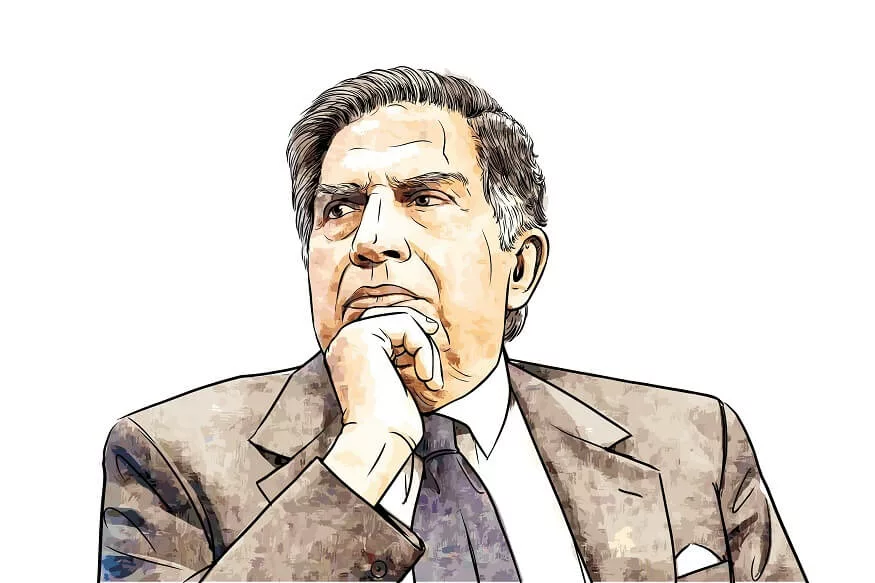Ratan Tata, a name that resonates with greatness, has symbolized leadership, innovation, and entrepreneurship in India and globally. Born into the influential Tata family, Ratan Tata’s journey to becoming one of the most respected figures in the business world is inspiring. From humble beginnings to steering the Tata Group to new heights, his life has been a series of remarkable accomplishments that have left an indelible mark on the Indian industry, the global business landscape, and the lives of millions of people. Delve into the biography of Ratan Tata, a business legend whose vision revolutionized the Tata Group and influenced the global business ecosystem with his leadership and ethical approach.
This article delves deep into the biography of Ratan Tata, exploring his early life, career trajectory, leadership at Tata Group, milestones he achieved, transformative business ventures, philanthropic efforts, and impact on the world. Through this journey, we will also touch upon the lessons of resilience, integrity, and vision that Ratan Tata has imparted to entrepreneurs and business leaders worldwide. Uncover the biography of Ratan Tata, one of India’s most respected industrialists.
Early Life and Education

Ratan Naval Tata was born on December 28, 1937, in Bombay (now Mumbai), India. His early life was marked by privilege, as he was born into one of India’s most prominent industrial families. His grandfather, Jamsetji Tata, founded the Tata Group, which went on to become one of India’s largest conglomerates. Ratan Tata’s father, Naval Tata, also significantly expanded the Tata family’s business empire.
However, despite the family’s wealth and success, Ratan Tata’s childhood was not entirely without challenges. Ratan’s parents separated when he was very young, and he was primarily raised by his grandmother, Lady Navajbai Tata, who strongly influenced him. His upbringing emphasized values such as humility, hard work, and integrity—qualities that Ratan Tata would carry throughout his life.
He attended the Campion School in Mumbai, where he excelled academically, and later studied at the prestigious Cathedral and John Connon School. He pursued higher education at Cornell University in the United States, where he completed a Bachelor’s degree in Architecture. Following this, he went to Harvard Business School, where he earned his management degree in 1975.
Joining Tata Group: The Early Years
Ratan Tata’s professional career began in the 1960s when he joined the Tata Group in 1962. He was not immediately positioned at the helm of the family business but started at the bottom. This decision by his elders was deliberate, as they wanted him to understand the company’s operations thoroughly before assuming a leadership role. Ratan Tata was assigned various roles in the Group’s subsidiaries, gaining exposure to real-world challenges. His first significant assignment was with Tata Steel, where he worked in the factory and learned the nuances of industrial operations.
Over the years, Ratan Tata has handled complex challenges and leadership roles. His early years at Tata Group helped him develop a deep understanding of the family business and its ethical values. This hands-on experience and his formal education equipped him with the skills and knowledge necessary to lead the Tata Group when the time came.
Becoming Chairman of Tata Group
Ratan Tata’s defining moment came in 1991 when he was appointed Chairman of Tata Group, succeeding the legendary J.R.D. Tata. The leadership transition was not without controversy, as some questioned Ratan Tata’s readiness to lead such a vast and diversified conglomerate. However, he quickly proved his capabilities by navigating the challenges of his new role.
One of Ratan Tata’s first tasks was steering the Tata Group through a period of economic transformation in India. The 1990s were marked by liberalization, and India was transitioning from a closed economy to an open market. The challenges were immense—Tata Group had to adapt to a globalized world while holding on to its core values of trust and ethical business practices.
Under Ratan Tata’s leadership, the group significantly shifted toward modernization and international expansion. He was instrumental in restructuring and diversifying the business, making it more competitive and globally recognized. Once focused primarily on steel and chemicals, Tata Group ventured into new sectors like automobiles, telecommunications, information technology, and hospitality, making it a multi-industry behemoth.
Transforming Tata Group: Achievements and Milestones

A series of bold moves and transformative decisions characterize Ratan Tata’s leadership at Tata Group. Some of the most notable achievements under his stewardship include:
- Tata Motors and the Tata Nano: One of Ratan Tata’s most ambitious and visionary projects was the development of the Tata Nano, which he envisioned as the “world’s cheapest car.” Launched in 2008, the Nano aimed to provide affordable mobility to India’s masses, particularly the middle-class population. Though the Nano did not achieve the anticipated success in the market, it was a testament to Ratan Tata’s commitment to addressing societal challenges through innovation.
- Tata Steel Acquires Corus: In 2007, Tata Steel made a landmark acquisition by purchasing the British steel company Corus for $12 billion, marking one of the most significant foreign acquisitions by an Indian company. This move was part of Tata Group’s strategy to become a global leader in the steel industry. The acquisition allowed Tata Steel to expand its reach in the European market and solidified the Group’s position as an international player.
- Tata Consultancy Services (TCS): Tata Consultancy Services (TCS) grew exponentially during Ratan Tata’s tenure. Under his leadership, TCS became a global IT services giant, contributing significantly to India’s IT export revenues. TCS went public in 2004 and soon became one of India’s most valuable companies, with Ratan Tata overseeing its rise as a global technology leader.
- Tata Group’s Global Expansion: Ratan Tata was instrumental in transforming Tata Group into a global conglomerate. The Group’s investments in international companies like Tetley Tea (UK), Jaguar Land Rover (UK), and The Pierre (New York) marked a significant shift towards globalization. These acquisitions diversified the Group’s portfolio and boosted its reputation as an internationally competitive business entity.
- Tata Trusts: Ratan Tata’s leadership was not just about business success; he was also deeply committed to social responsibility. Tata Trusts, a philanthropic organization, has significantly advanced healthcare, education, rural development, and infrastructure in India. Under Ratan Tata’s leadership, the Trusts made landmark contributions to various social causes, including establishing the Tata Cancer Research Institute and funding rural development initiatives nationwide.
Philanthropic Efforts and Legacy
Ratan Tata is known for his unwavering commitment to social causes and philanthropy. Unlike many corporate leaders, he has always emphasized the importance of using wealth for the greater good of society. He has consistently advocated for corporate responsibility and ethical leadership, ensuring that the Tata Group’s wealth contributed to India’s growth and development.
2008, Tata Group was ranked as one of India’s most socially responsible businesses. Tata Trusts, which controls over 60% of the company’s equity, has contributed to many causes, from healthcare to education, and has funded initiatives to reduce poverty and empower communities.
Much of Tata’s wealth earned through his leadership in the Tata Group is largely untapped. He has clarified that he prefers to remain humble and not believe in a lavish lifestyle. His philanthropic work has become an integral part of his legacy, and he continues to be a role model for business leaders and entrepreneurs globally.
Ratan Tata’s Investments: A Vision for the Future
In recent years, Ratan Tata has shifted his focus towards investments in startups and emerging businesses. Despite stepping down as Chairman of Tata Group in 2012, he has remained influential in the Indian business world, particularly in startups and innovation.
Ratan Tata has invested in numerous Indian startups, including Urban Ladder, Snapdeal, and Ola. His ability to identify opportunities in emerging industries and willingness to take risks have allowed him to continue shaping the future of Indian business. His investments reflect his belief in fostering innovation and supporting young entrepreneurs, further solidifying his status as a visionary leader.
Conclusion
The biography of Ratan Tata from a young, humble entrepreneur to one of the most respected business leaders in the world is a testament to his vision, resilience, and commitment to positively impacting society. Through his leadership at Tata Group, he transformed one of India’s oldest and largest conglomerates and the landscape of Indian business, setting new standards for corporate governance, innovation, and social responsibility.
His investments in various startups and commitment to philanthropy demonstrate that his influence goes far beyond the corporate world. Ratan Tata’s legacy includes ethical leadership, global expansion, and unwavering social commitment. His story inspires generations of entrepreneurs, business leaders, and individuals who believe in using business for good.
As Ratan Tata continues contributing to the business world and society, his journey will remain a shining example of how leadership, innovation, and compassion can create lasting positive change. Explore the biography of Ratan Tata, whose visionary leadership transformed Tata Group into a global powerhouse.




